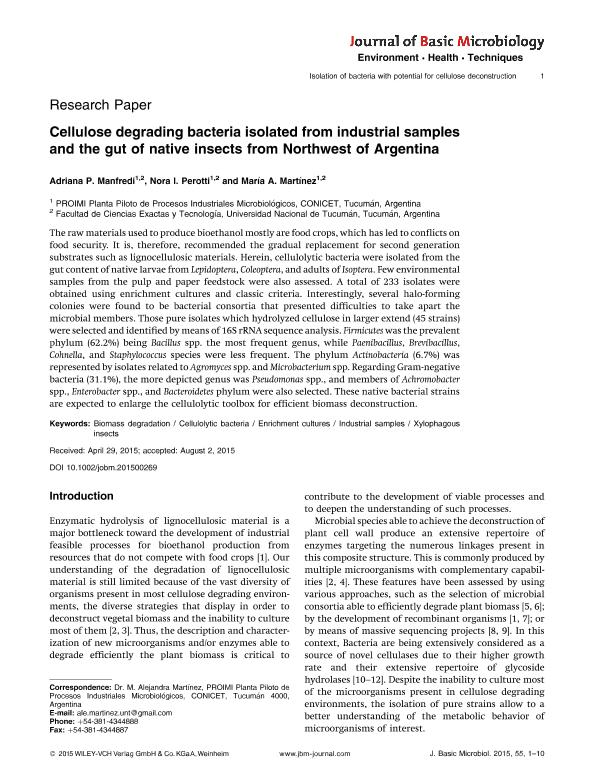Artículo
Cellulose degrading bacteria isolated from industrial samples and the gut of native insects from Northwest of Argentina
Fecha de publicación:
09/2015
Editorial:
Wiley Vch Verlag
Revista:
Journal Of Basic Microbiology
ISSN:
0233-111X
Idioma:
Inglés
Tipo de recurso:
Artículo publicado
Clasificación temática:
Resumen
The raw materials used to produce bioethanol mostly are food crops, which has led to conflicts on food security. It is, therefore, recommended the gradual replacement for second generation substrates such as lignocellulosic materials. Herein, cellulolytic bacteria were isolated from the gut content of native larvae from Lepidoptera, Coleoptera, and adults of Isoptera. Few environmentalsamples from the pulp and paper feedstock were also assessed. A total of 233 isolates were obtained using enrichment cultures and classic criteria. Interestingly, several halo-forming colonies were found to be bacterial consortia that presented difficulties to take apart the microbial members. Those pure isolates which hydrolyzed cellulose in larger extend (45 strains) were selected and identified by means of 16S rRNA sequence analysis. Firmicutes was the prevalent phylum (62.2%) being Bacillus spp. the most frequent genus, while Paenibacillus, Brevibacillus, Cohnella, and Staphylococcus species were less frequent. The phylum Actinobacteria (6.7%) was represented by isolates related to Agromyces spp. and Microbacterium spp. Regarding Gram-negative bacteria (31.1%), the more depicted genus was Pseudomonas spp., and members of Achromobacter spp., Enterobacter spp., and Bacteroidetes phylum were also selected. These native bacterial strains are expected to enlarge the cellulolytic toolbox for efficient biomass deconstruction.
Archivos asociados
Licencia
Identificadores
Colecciones
Articulos(PROIMI)
Articulos de PLANTA PILOTO DE PROC.IND.MICROBIOLOGICOS (I)
Articulos de PLANTA PILOTO DE PROC.IND.MICROBIOLOGICOS (I)
Citación
Manfredi, Adriana Paola; Perotti, Nora Ines; Martinez, Maria Alejandra; Cellulose degrading bacteria isolated from industrial samples and the gut of native insects from Northwest of Argentina; Wiley Vch Verlag; Journal Of Basic Microbiology; 55; 12; 9-2015; 1384–1393
Compartir
Altmétricas




